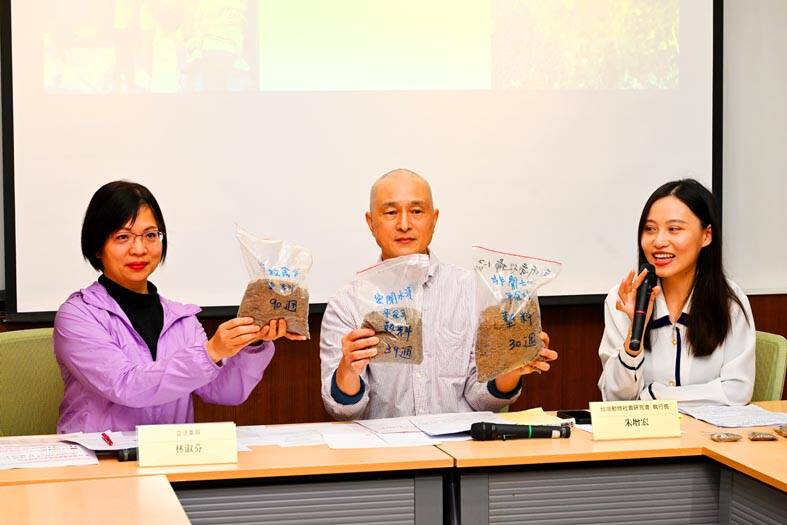Providing subsidies to poultry farms to build better coops cannot resolve issues arising from an industry plagued by a backward system of raising chickens and lagging technology, animal groups and Democratic Progressive Party Legislator Lin Shu-fen (林淑芬) said yesterday.
More than 80 percent of hens in the nation are still kept in cages with no room to move, Environment and Animal Society of Taiwan executive director Chu Tseng-hung (朱增宏) told a news conference at the Legislative Yuan in Taipei.
These chickens have lower immunity systems because they are constantly under stress, Chu added.

Photo: Tien Yu-hua, Taipei Times
A special budget to help farmers upgrade coops should be based on the Council of Agriculture’s Friendly Egg-laying System Definition and Guidelines (雞蛋友善生產系統定義及指南) to establish model farms, he said.
Coop upgrades should be a decade-long project, with rolling reviews on existing regulations, such as the Regulation on Animal Husbandry Registration (畜禽飼養登記管理辦法), Chu said.
This would remove roadblocks to upgrading the poultry industry, and help encourage and subsidize egg farmers to transition to an animal-friendly production model, he said.
The government should also amend the Standards for Primary Facilities at Husbandry Farms (畜牧場主要設施設置標準) to prohibit the building of new battery cages and demand that farmers comply with the mid-to-long term upgrade project to gradually phase out such cages, he said.
Chu also urged the government to step up education and research into animal-friendly husbandry and to encourage more young people to join the industry.
Citing 2021 statistics from the Food and Agriculture Organization, Environment and Animal Society of Taiwan member Tsun Fang-chu (寸舫筑) said that Taiwan’s annual average egg production per hen, at 190, or 52 percent, was lower than the global average of 202.
Despite raising more chickens, the poultry industry produced fewer eggs, Tsun said, adding that pollution by the industry is a problem.
More than 60 percent of farmers older than 60 were unable to keep up with the industry’s modernization, she said.
Despite the government providing NT$1.05 billion (US$34.29 million) in subsidies, only 200, or one-10th, of all coops could be upgraded, Lin said, adding that subsidies for lagging chicken-raising systems suggest government negligence.
Subsidies should be given out to farms that follow the council’s standards, with every egg-laying hen having 750m2 of space to move in, Lin said.

A preclearance service to facilitate entry for people traveling to select airports in Japan would be available from Thursday next week to Feb. 25 at Taiwan Taoyuan International Airport, Taoyuan International Airport Corp (TIAC) said on Tuesday. The service was first made available to Taiwanese travelers throughout the winter vacation of 2024 and during the Lunar New Year holiday. In addition to flights to the Japanese cities of Hakodate, Asahikawa, Akita, Sendai, Niigata, Okayama, Takamatsu, Kumamoto and Kagoshima, the service would be available to travelers to Kobe and Oita. The service can be accessed by passengers of 15 flight routes operated by

GIVE AND TAKE: Blood demand continues to rise each year, while fewer young donors are available due to the nation’s falling birthrate, a doctor said Blood donors can redeem points earned from donations to obtain limited edition Formosan black bear travel mugs, the Kaohsiung Blood Center said yesterday, as it announced a goal of stocking 20,000 units of blood prior to the Lunar New Year. The last month of the lunar year is National Blood Donation Month, when local centers seek to stockpile blood for use during the Lunar New Year holiday. The blood demand in southern Taiwan — including Tainan and Kaohsiung, as well as Chiayi, Pingtung, Penghu and Taitung counties — is about 2,000 units per day, the center said. The donation campaign aims to boost

ENHANCING EFFICIENCY: The apron can accommodate 16 airplanes overnight at Taoyuan airport while work on the third runway continues, the transport minister said A new temporary overnight parking apron at Taiwan Taoyuan International Airport is to start operating on Friday next week to boost operational efficiency while the third runway is being constructed, the Ministry of Transportation and Communications said yesterday. The apron — one of the crucial projects in the construction of the third runway — can accommodate 16 aircraft overnight at the nation’s largest international airport, Minister of Transportation and Communications Chen Shih-kai (陳世凱) told reporters while inspecting the new facility yesterday morning. Aside from providing the airport operator with greater flexibility in aircraft parking during the third runway construction,

American climber Alex Honnold is to attempt a free climb of Taipei 101 today at 9am, with traffic closures around the skyscraper. To accommodate the climb attempt and filming, the Taipei Department of Transportation said traffic controls would be enforced around the Taipei 101 area. If weather conditions delay the climb, the restrictions would be pushed back to tomorrow. Traffic controls would be in place today from 7am to 11am around the Taipei 101 area, the department said. Songzhi Road would be fully closed in both directions between Songlian Road and Xinyi Road Sec 5, it said, adding that bidirectional traffic controls would